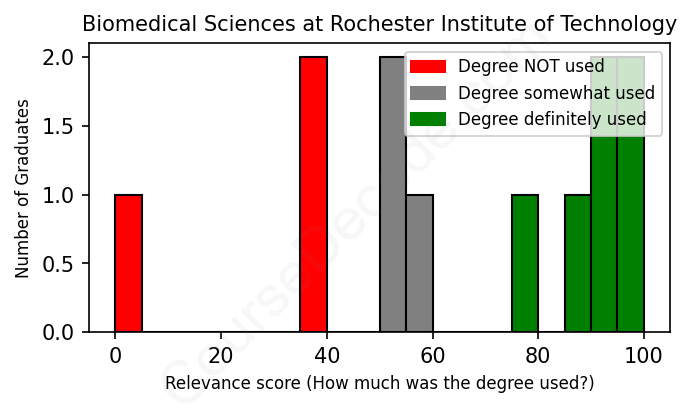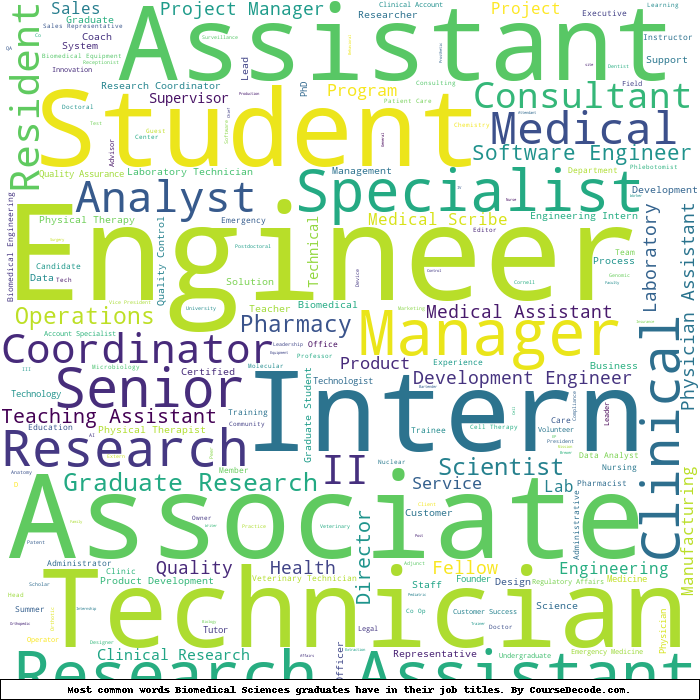
First, some facts. Of the Biomedical Sciences graduates from Rochester Institute of Technology we've analyzed , here's how many have used (or NOT used) their degree in their career:

These are estimates based on AI analysis of 12 LinkedIn profiles (see below).
The verdict? Slightly below average. Overall, with an average relevance score of 64%, Biomedical Sciences graduates from Rochester Institute of Technology have a slightly lower likelihood (-3%) of finding work in this field compared to the average graduate across all fields:
And for comparison, here's the chart for all profiles we've looked at across all degrees.
Also, after graduating, 66% of these graduates have pursued further education other than another Bachelor's degree (such as a Masters degree or other), compared to the average across all profiles of 35%. This suggests you may need more than just a Bachelors degree to be competitive as a Biomedical Sciences graduate.
See the details:
|
Relevance score: 55% We think this person has gone into a career only somewhat relevant to their degree. We think this person has gone into a career only somewhat relevant to their degree.
DEGREE INFOGraduated in 2021 from Rochester Institute of Technology with a Bachelor of Science - BS in Biomedical Sciences. Also pursued further education since (see below). JOB HISTORY SINCE GRADUATIONStudent Research Fellow Masonic Medical Research Institute - MMRI Jun 2021 - Aug 2021 Patient Care Technician  WellNow Urgent Care Aug 2021 - Dec 2022 FURTHER DEGREES DONE SINCE GRADUATINGMaster of Science - MSAlbany Medical College 2023 - 2025 ABOUTNo information provided. |
The top 10 most common jobs done by the graduates we've analyzed (ranked most common to least) are:
From analyzing the LinkedIn profiles of graduates from the Biomedical Sciences program at Rochester Institute of Technology, it’s clear that many have pursued careers that vary quite a bit in their relevance to the field. A significant number landed roles as Genetic Counselors, Physician Assistants, or in research positions that directly utilize their biomedical knowledge. For instance, positions like Cancer Genetic Counseling Interns or Emergency Medicine Physician Assistants strongly align with what they learned in school, focusing on genetics, patient care, and the application of biomedical principles in real-world scenarios.
However, there are also graduates who ventured into jobs that are less directly related to their degrees. Roles in community outreach, food distribution, and even coaching seemed to sidestep the specialized biomedical training they completed. While these jobs might benefit from some general knowledge about health and human biology, they don’t capitalize on the core competencies of a Biomedical Sciences education. Overall, it looks like while some graduates are effectively leveraging their degrees in significant biomedical roles, many others have taken a different path that doesn’t fully utilize their academic background. It’s kind of a mixed bag!
Here is a visual representation of the most common words in job titles for Biomedical Sciences graduates (this is across all Biomedical Sciences graduates we've analyzed, not just those who went to Rochester Institute of Technology):

Looking at the career trajectories of graduates from the Biomedical Sciences program at Rochester Institute of Technology, it's clear that many students find themselves stepping into healthcare-related roles soon after graduation. For instance, many of the earlier graduates started off in positions such as genetic counseling interns, EMTs, or medical scribes. This trend of entering healthcare settings continues over the years, as many eventually progress into more specialized roles. By the five- to ten-year mark, we've seen individuals land significant positions such as physician assistants, genetic counselors, and even researchers at prominent entities like the National Cancer Institute and biotech companies. Overall, it seems that a good chunk of these graduates are succeeding in careers that align with their academic backgrounds.
On the flip side, there are also instances where the path diverges from strictly biomedical sciences. Some graduates wind up in roles that, while they may utilize some of the skills learned during their studies, don't directly relate to the field, like managing community programs or working as art instructors. This showcases a bit of variety in career outcomes, where individual interests and opportunities play a big role. In sum, while a lot of alumni are doing impressive work within the biomedical or healthcare sectors, there are also those who explore totally different avenues. It's a mixed bag, but overall, the prospects for a fulfilling career in the biomedical field seem quite promising for those who stick with it!
Honestly, a Bachelor degree in Biomedical Sciences can be pretty challenging, especially at a solid school like Rochester Institute of Technology. You'll be diving into a lot of complex subjects like biology, chemistry, and even some physics, which can feel overwhelming at times. The coursework often involves a mix of lectures, lab work, and projects that require a lot of critical thinking and problem-solving skills. It's not necessarily the hardest degree out there, but you definitely need to be dedicated and manage your time well. If you enjoy science and are okay with putting in some effort, you’ll probably find it rewarding, but it won’t be a walk in the park!
Most commonly, in the LinkedIn profiles we've looked at, it takes people 4 years to finish a Bachelor degree in Biomedical Sciences.
Looking at these Biomedical Sciences graduates from Rochester Institute of Technology, it seems that many of them are on solid career paths, especially those working in healthcare and research roles. The Genetic Counselor position at Dana-Farber, for instance, likely pays pretty well, given the importance of that role in cancer care. Similarly, the Physician Assistants are generally well-compensated, with their salaries often reflecting their skills and demands in the medical field. Others, like those working at Foodlink, might not be pulling in as much, especially in service roles, but they’re still contributing to meaningful work. It’s a mixed bag overall, but many seem to be building a decent income, especially as they gain experience and move up in their careers.
Here is a visual representation of the most common words seen in the "about" section of LinkedIn profiles who have a Bachelor degree in Biomedical Sciences (this is across all Biomedical Sciences graduates we've analyzed, not just those who went to Rochester Institute of Technology). This may or may not be useful:

Here are all colleges offering a Bachelor degree in Biomedical Sciences (ordered by the average relevance score of their Biomedical Sciences graduates, best to worst) where we have analyzed at least 10 of their graduates:
| College | Score | Count |
|---|---|---|
 Western Michigan University Western Michigan University
|
81 | 17 |
 Marquette University Marquette University
|
78 | 29 |
 University of Michigan University of Michigan
|
77 | 10 |
 Colorado State University Colorado State University
|
77 | 19 |
 University at Buffalo University at Buffalo
|
75 | 18 |
 California Polytechnic State University-San Luis Obispo California Polytechnic State University-San Luis Obispo
|
74 | 13 |
 University of Connecticut University of Connecticut
|
74 | 15 |
 Texas A&M University Texas A&M University
|
73 | 59 |
 Auburn University Auburn University
|
71 | 26 |
 Northern Arizona University Northern Arizona University
|
71 | 15 |
 Rensselaer Polytechnic Institute Rensselaer Polytechnic Institute
|
70 | 10 |
 University of Central Florida University of Central Florida
|
69 | 26 |
 University of South Florida University of South Florida
|
68 | 48 |
 Georgia Institute of Technology Georgia Institute of Technology
|
67 | 41 |
 The Ohio State University The Ohio State University
|
64 | 14 |
 Rochester Institute of Technology Rochester Institute of Technology
|
64 | 12 |
 Case Western Reserve University Case Western Reserve University
|
63 | 12 |
 Grand Valley State University Grand Valley State University
|
59 | 35 |
 Arizona State University Arizona State University
|
58 | 12 |